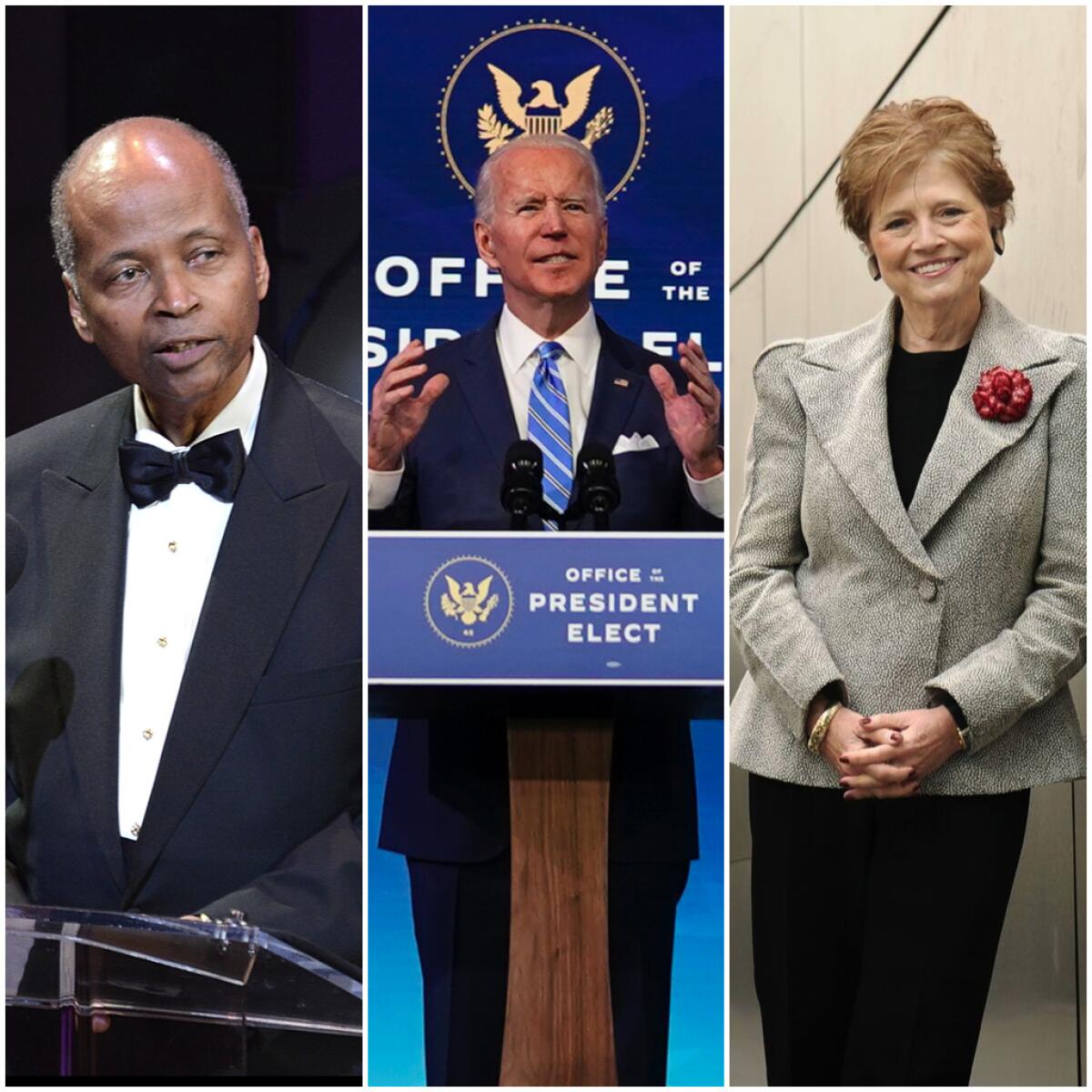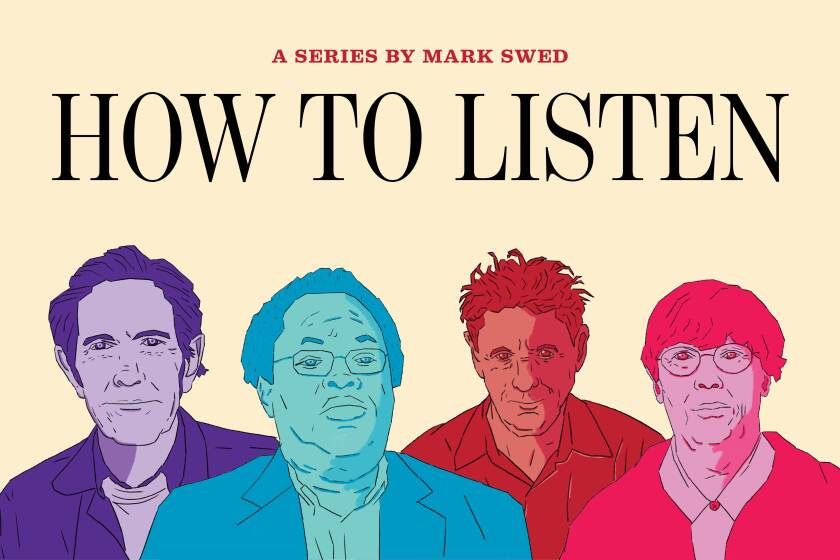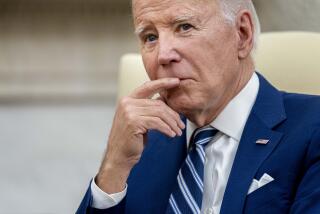Commentary: How about some culture in the Biden Cabinet? My nominees for Mr. or Madame Secretary

Eight years ago, as President Obama was about to be sworn in for his second term, I noted that in the crush of inauguration activities he had forgotten something. Obama inadvertently omitted naming a new Cabinet member to be sent to the Senate for confirmation. Where was his secretary of Culture?
You might question whether I was the one who had forgotten something. Oh, right, we don’t have a Cabinet-level post for culture like they do in England, France, Germany, Albania (yes, Albania) and more than 50 other countries that count themselves civilized.
My proposal for creating such a post was not new: The arts were of enormous economic benefit, and the country was still recovering from the Great Recession of four years earlier. A shared culture is supposed to be what unites us as Americans, but we were increasingly divided. The National Endowment for the Arts and the National Endowment for the Humanities, through which the U.S. government supports arts and culture, have pitifully ungenerous budgets and had become dishearteningly large political footballs. Standing outside politics (at least in principle), a Secretary of Culture could bring a broad social, economic, environmental and human perspective to the discussion of national policy in Cabinet meetings and in public forums.
It was time, but it wasn’t going to happen. President Obama had to choose his battles. We all knew that. But in the aftermath of Donald Trump, the argument seems to have caught on around the nation. New York Times critic-at-large Jason Farago has examined the ins and outs of a Cabinet post for culture. Washington Post theater critic Peter Marks has settled for the second-best thing, a Dr. Fauci for the arts. San Francisco Chronicle music critic Joshua Kosman has called for a new WPA, the Works Progress Administration that employed many artists as part of Franklin D. Roosevelt’s New Deal.
Joe Biden and Kamala Harris might well be open to such notions. The pandemic has provided a potent blow to the cultural life of this country, creating tremendous financial hardship. That alone should be reason enough.
Another argument commonly given for a Department of Culture is the role the arts play in our understanding of, our participating in and our responsibilities toward our humanity. The arts are engines of empathy. I gather politicians like to hear such things.
Farago employs Aristotle’s advocacy of catharsis for further justification. What you take away from hearing a symphony, taking in an opera, attending a play, seeing an exhibition, reading a poem can elevate your psychic well-being. I suppose they can, but that is not so common as you might think. Just attend a rapt performance at the Metropolitan Opera and watch as New Yorkers fight their way out to be first for a cab.
Indeed, I’ve spent my life at concerts and operas. How many have provided an actual catharsis? Very few, to be honest. Were it otherwise, you’d lose your mind in no time.
Moreover, we hardly need the arts and culture to tell us how to feel. We’ve already got politicians demonstrating just how easily feelings can be manipulated. Witness the recent riot at the U.S. Capitol in the name of patriotism. Art, too, is easily manipulated. Wilhelm Furtwängler led a shockingly stirring performance of Beethoven’s “Ode to Joy,” that celebration of universal brotherhood, to celebrate Hitler’s birthday in 1942, while Leonard Bernstein conducted it as an authentically stirring ode to freedom to celebrate the fall of the Berlin Wall 47 years later.
Instead, let the point of art be nothing more than the pointing out of something you hadn’t noticed before. That something might matter or not. It might be a good thing or a bad thing, a big deal or nothing at all. But the act of noticing connects us with the world around us, our environment and all that inhabit it.
Art is ultimately entanglement. When we engage in it, we engage in something beyond us. We are permitted to give up an iota of ego. If you ask this arts addict, the single most destructive force in America today is the excess of ego in D.C. Reduce that, and we can save democracy and the planet along with it.
Coronavirus may have silenced our symphony halls, taking away the essential communal experience of the concert as we know it, but The Times invites you to join us on a different kind of shared journey: a new series on listening.
Ideally, then, a Department of Culture would resemble fungi, which operate in vast interconnected underground networks as described in Merlin Sheldrake’s marvelous new book, “Entangled Life: How Fungi Make Our Worlds, Change Our Minds & Shape Our Futures.” Unlike the fiefdoms of other federal departments and agencies, Culture would have the facility to connect with and ultimately entangle Commerce, Education, Energy, Environmental Protection, State, Interior, Labor and others. It would provoke them to maintain as their central mission their place in society and its well-being, while at the same time tapping their resources to shore up our cultural life.
A Secretary of Culture would serve not as advisor to the president but as a conscience to government itself. Mr. or Madame Secretary would set a national tone of cultural ambition. If you are worried about politicizing culture, don’t be. Artists are rebels. Any benighted culture czar who happens to come along will have to contend with socially nourishing revolutionary art. We can’t lose.
So, who shall it be? My candidates last time around were director Peter Sellars and conductor and Bard College President Leon Botstein. As the artistic director of the 2016 Ojai Music Festival, Sellars presented works confronting the history of race and art, and he gave prominence to three emerging artists — Julia Bullock, Tyshawn Sorey and Davóne Tines — who have since become three of the most powerful voices of our time, and notably during the pandemic. This goes to show you how cultural visionaries can prepare us for issues we all too easily overlook. Sellars and Botstein are still great choices.
This time, though, let me suggest more conventional administrators. They are Deborah Borda, president and CEO of the New York Philharmonic, and Wayne S. Brown, president and CEO of Michigan Opera Theatre.
Borda is simply our greatest arts administrator. At the Los Angeles Philharmonic she created the model for a socially engaged, artistically extravagant and fiscally empowered 21st century arts institution. Brown has Washington experience, having brilliantly run the music and opera programs at the NEA. Both, moreover, proved during the pandemic that they are exactly the leaders we need in times of crisis.
In New York, Borda treated her orchestra as frontline cultural emissaries, especially in the way players roved the city’s boroughs in flatbed trucks spreading goodwill. She also kept alive her vital vision for the future, the half-billion-dollar renovation of Lincoln Center’s David Geffen Hall. Brown last summer made Michigan Opera Theatre the new ideal of a socially and culturally astute institution by appointing as its artistic director Yuval Sharon, who is ideally suited to making art that speaks to our immediate cultural and racial predicaments.
Borda and Brown have the essential gift to work across any aisle our obstructionist government will put in front of them. They both have something else we really should want — a sense of humor. They’re already making America not just feel better but be better. Does anyone think we don’t need that?
More to Read
The biggest entertainment stories
Get our big stories about Hollywood, film, television, music, arts, culture and more right in your inbox as soon as they publish.
You may occasionally receive promotional content from the Los Angeles Times.








